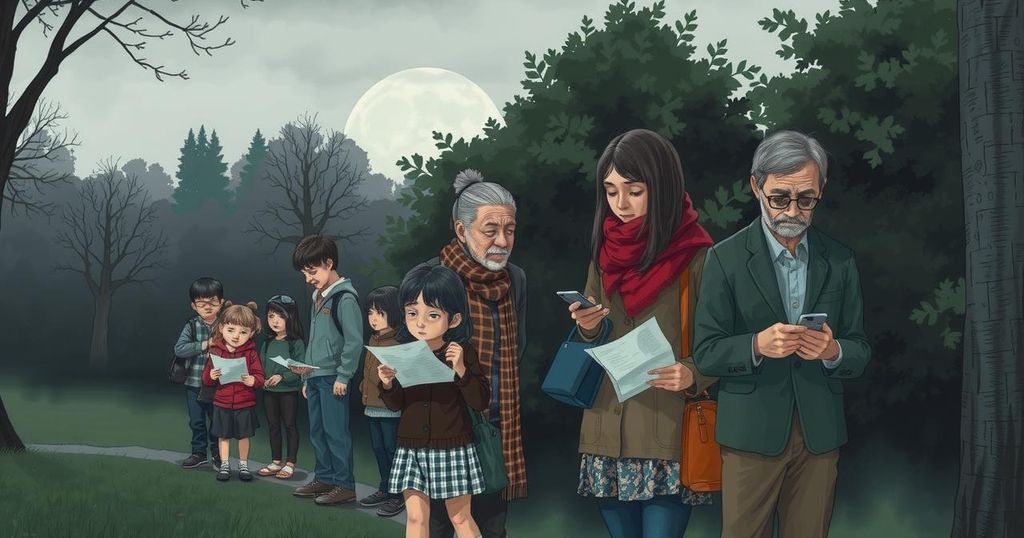Crime
ALI DAVID NAVAS VIZCAYA, AP, ASIA, BARBER, CRIME, CUBA, EL SALVADOR, FAMILY, ICE, IMMIGRATION AND CUSTOMS ENFORCEMENT, JOHANNY SÁNCHEZ, MEXICO, MIGRATION, MISSING PERSONS, NORTH AMERICA, PHILIPPINES, SOCIAL MEDIA, SOUTH AMERICA, TREN DE ARA, TRUMP, U. S, U. S. IMMIGRATION AND CUSTOMS ENFORCEMENT, VENEZUELA, XI
Fatima Khan
0 Comments
Families of Venezuelan Migrants Search Amid Deportation Crisis – ICE Locator Failure
Following recent U.S. deportation flights, families of over 200 Venezuelan migrants are urgently seeking information about their loved ones, many of whom have been transferred to a maximum-security prison in El Salvador. Allegations of gang membership and a lack of evidence raise serious concerns regarding the treatment of these individuals. The Venezuelan government condemns the deportations as kidnappings, while families express their agony and fear amidst this crisis.
In a distressing turn of events, families of Venezuelan migrants are frantically searching for their loved ones after over 200 immigrants were taken on recent U.S. deportation flights. These individuals were reportedly flown to a maximum-security prison in El Salvador after disappearing from the U.S. Immigration and Customs Enforcement’s (ICE) online detainee locator, raising alarm among families who are left without information regarding the whereabouts of their relatives.
One heartbreaking case involves Franco Caraballo, a 26-year-old barber, who was apprehended along with other Venezuelans at a detention facility in Texas. There, he was handcuffed and placed on a plane without knowledge of his destination. After hours of uncertainty, his wife, Johanny Sánchez, discovered he had been sent to El Salvador, where he now stands accused of gang affiliation—the legitimacy of which she vehemently disputes.
As many families grapple with shock and confusion, they report difficulty in determining if their loved ones are among those held in the El Salvadoran prison. Conditions in this facility, described as draconian, deny visitors and limit educational programs. The U.S. government has allocated $6 million to the Salvadoran administration to detain these migrants, despite their uncertain legal status, as deportees from the U.S. to Venezuela are rarely accepted.
The backdrop of this crisis is a mass exodus of Venezuelans, amounting to nearly eight million since 2013 due to an economic collapse. With COVID-19 restrictions easing, many sought refuge in the U.S. Under President Trump, a notable policy change involved invoking the Alien Enemies Act, permitting deportation without legal recourse, which many view as an infringement on migrant rights.
The Trump administration insists these deportations target gang members from the Tren de Aragua, who allegedly pose a national threat. However, U.S. officials acknowledged in a recent legal filing that many of those deported lack criminal records, with claims of gang affiliation remaining unsubstantiated.
Sánchez reflects on her husband’s interactions with immigration authorities, emphasizing that they complied with all legal requirements in securing his asylum. She described their perilous journey from Venezuela, enduring severe hardships, in hopes of starting anew in the U.S. However, she now fears the U.S. has become a source of dread rather than safety.
In a response to these developments, the Venezuelan government condemned the deportations as “kidnappings,” calling for protests to demand the return of detained individuals. Prominent officials are urging Venezuelans abroad to come back home, lamenting that the pursuit of the American dream has resulted in despair, particularly for those now imprisoned in El Salvador.
The plight of Venezuelan migrants in U.S. detention and subsequent deportation underscores significant concerns regarding treatment and legal processes in immigration enforcement. Families are facing anxiety and uncertainty, compounded by allegations of gang affiliation without substantiated evidence. The humanitarian implications and political ramifications of such policies merit comprehensive scrutiny, particularly as foreign relations and migrant rights hang in the balance.
Original Source: www.pbs.org




Post Comment